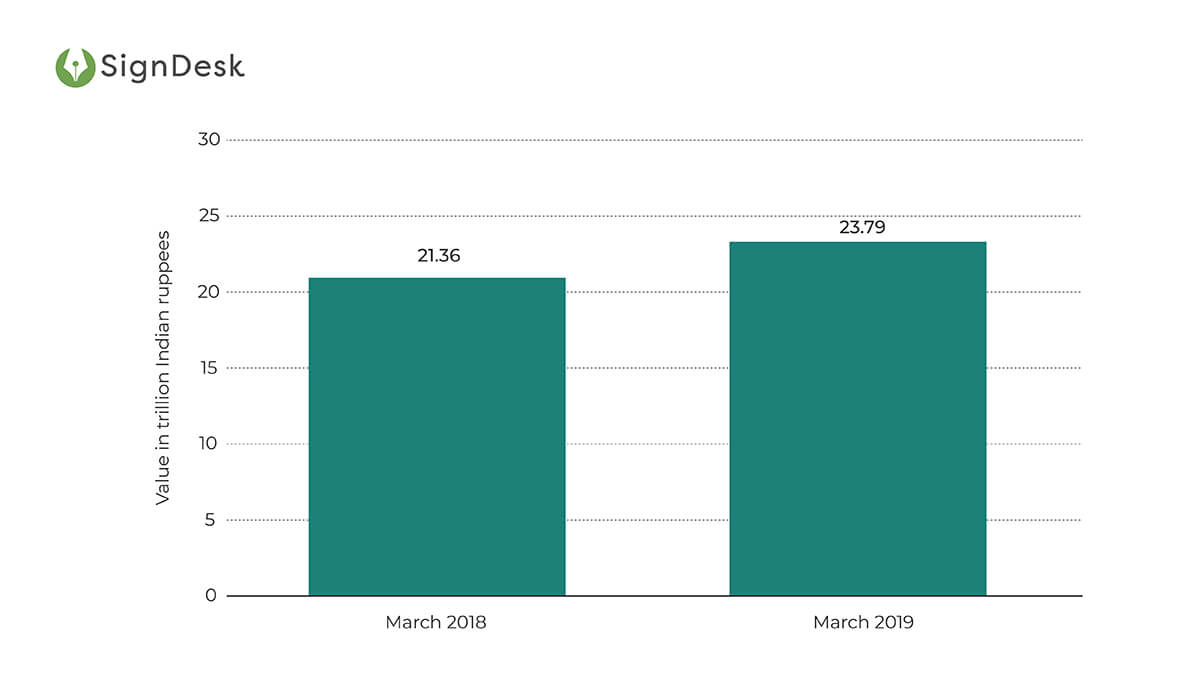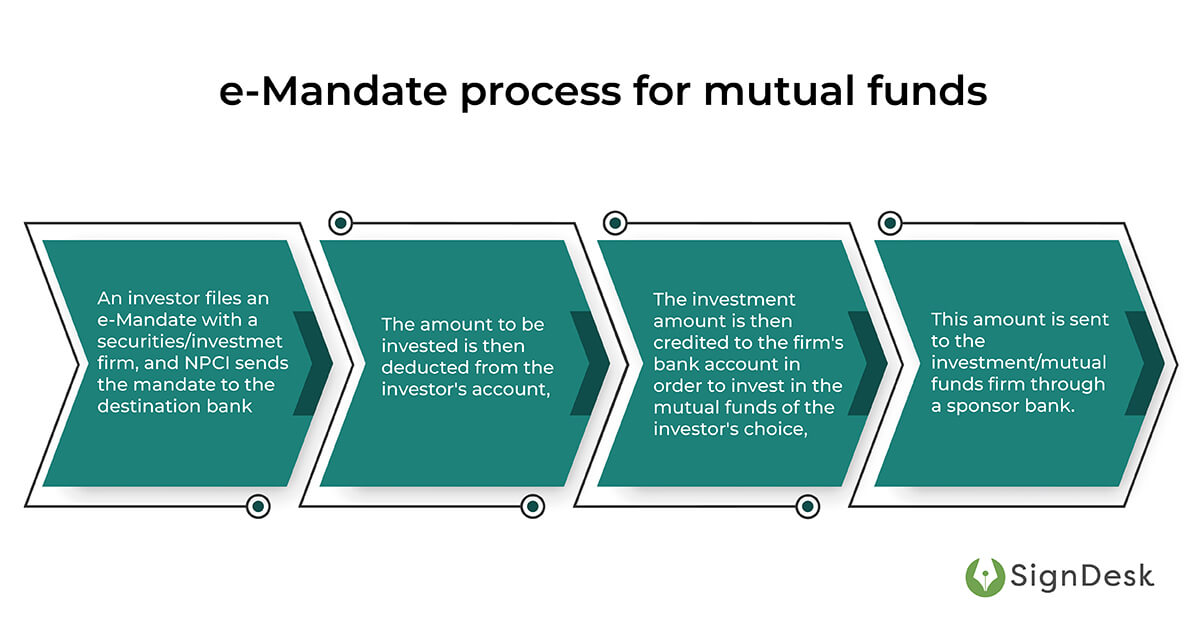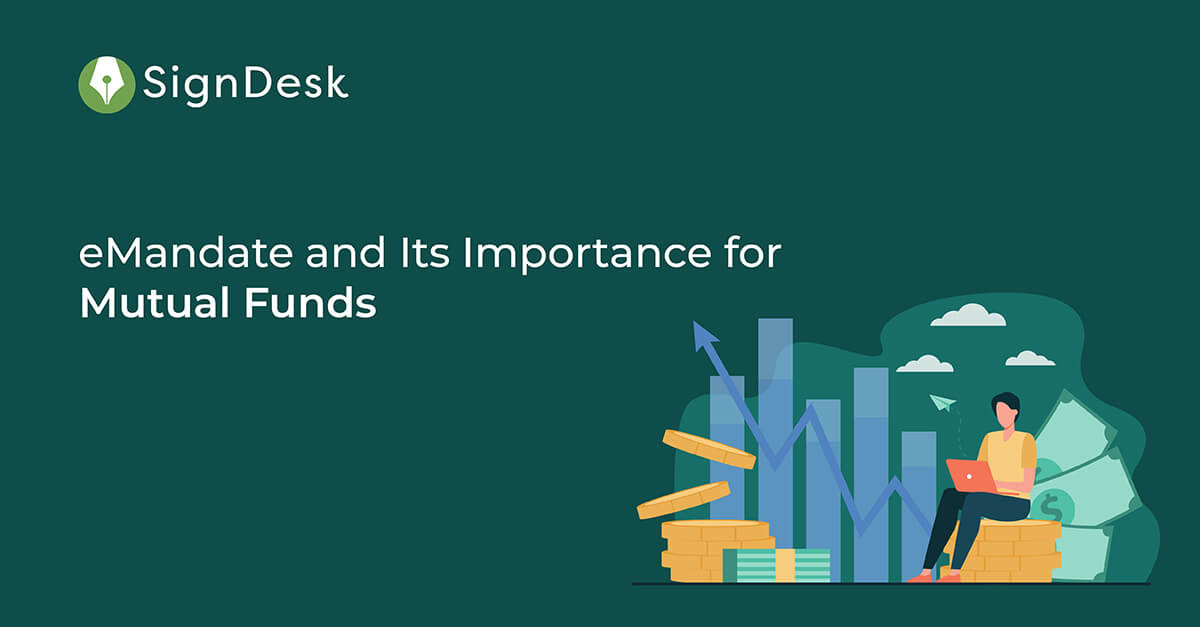Mutual Funds – Growth & Need for Investment Automation
A pertinent outcome of the ongoing digital revolution in India is the recent boom in Mutual Fund (MF) investments. Investment firms have onboarded over 3.2 million fresh investors in 2017, and these numbers have only gone up since partly due to digital initiatives undertaken by both The Association of Mutual Funds India (AMFI) and the Securities and Exchange Board of India (SEBI).
This is despite the fact that demand for gold, the traditional investment alternative, declined by 14% during the same time period, according to reports.
Further, as of March 2019, the assets under management (AUM) of the Indian mutual fund investment sector grew to approximately 24 trillion Indian rupees. This was solid year-on-year growth of 11.4 percent compared to the previous year.

These rapid swells in cash flow are due to the ease of opening and investing in mutual fund profiles, thanks to payments automation technology and eMandates.
Typically, investors place money into mutual funds through a Systematic Investment Plan (SIP), which must be registered with the mutual fund by submitting a fully completed SIP form with all the relevant information.
Then, the bank mandate must be given to the bank accompanied by a canceled check. The Electronic Clearing Service (ECS) is recorded only after these documents have been confirmed by the bank.
The mutual fund formally starts the SIP account after the ECS is registered, and the investor’s bank account is debited each month on a specified date, to finance the SIP. The entire procedure is lengthy, and it can take anywhere from 20 to 25 days for the SIP to be registered.
Instead, using the eNACH eMandate route to register a mutual fund SIP is a more convenient option. eMandate for mutual funds usually involves just a few simple steps for the investor:
- Go to the bank’s website where you have an account
- Fill in the required details (Name, Aadhaar, email address, etc.) and select the bank
- Next, select the amount of the mandate and the time period for which it will be valid
- Authenticate your Aadhaar information instantly
- The eMandate takes effect in a couple of business days.
Note: Mandate registration is now completely paperless using eNACH eMandates. The bank account where the mandate is registered must be linked to the corresponding Aadhaar ID.
eMandate for mutual funds can be set up by investors and used anytime they start a new Systematic Investment Plan (SIP). As the eMandate is registered at the PAN level, it permits the creation of an unlimited number of SIPs across all the funds.
What is an E-Mandate?
A mandate is a standing order that an individual gives to an issuing bank to allow them to automatically debit a certain amount from their bank account.
The Reserve Bank of India and the National Payments Corporation of India established eMandate as a digital payment tool to help businesses optimize their payment processes. This procedure provides the foundation for financial institutions (FIs) to collect payments periodically without the need for manual involvement.
What are Mutual Funds?
A mutual fund is essentially a collective pooling of funds, which are managed professionally and used to invest in financial instruments such as stocks, bonds, money market instruments, and other assets.
In mutual funds, assets (capital in this case) are managed and allocated to achieve the objectives of the individual investors pooling the money and to align with the objectives of the investment firm.
Mutual funds are collective portfolios of considerable size, which were previously only accessible to large institutional investors. However, as a result of collectivization, large portfolios including major securities can be offered to smaller individual investors.
Mutual funds are utilized to invest in a diverse range of marketable assets. As is typical for securities, appreciation in value is measured as proportional to the fund’s total market capitalization and the performance of all the securities invested.
Challenges in Mutual Funds For Firms & Investors
When investing in a Mutual Fund online, the customer is normally required to sign a mandate and approve automatic debits.
Mandate authentication typically takes 10-20 days, and if clients rely on physical mandates this period is further lengthened due to processing errors for client signatures.
Due to high failure rates for physical mandates, which can go up to 40%, most of the mandates registered for mutual funds end up failing. This results in delayed financial operations, start-stop workflows which cause huge amounts of friction for investment firms, and frustration for investors many of whom are first-time users who have a high churn rate.
The operational challenges caused by inefficient mandate registration are harmful to securities firms, and both firms and investors need a convenient and automated option to easily manage recurring investment payments.
eNACH Mandate: Recurring Payments Automation
Mutual fund marketers record mandates with the registrar in the form of signed physical documents under the current system. For the time being, these must be signed and presented in physical form for processing. The E-Mandate system completely digitizes the process.
As a result, eNACH eMandate provides mutual fund investors and distributors with a very straightforward and hassle-free option. In the case of eMandates for mutual funds, the complete time cycle for registering mandates for SIPs is shortened from 3-4 weeks to just approximately 2-3 days.
E-Mandates For Mutual Fund Investment
Here are some things to know before registering an E-Mandate for mutual funds.
- This service is offered only to mutual fund investors who hold their funds in single mode. As of today, joint mode mutual fund holders are unable to use the E-Mandate facility.
- Aadhaar must sign and authenticate the eMandate electronically. One must confirm that the mobile number used for registering the eMandate matches the one used for Aadhaar. Additionally, the bank mandate one supplies for the eMandate must be Aadhaar validated.
- The eMandate feature is only available to banks that have been approved by National Payments Corporation of India (NPCI). The majority of India’s large banks are already NPCI-registered, so this should not be a problem.
- The maximum amount that can be invested periodically via the E-Mandate option is presently Rs. 1 lakh.
The E-NACH Mandate Process For Mutual Funds
Customers can use the eNACH/eMandate payment automation system to issue and confirm mandates using alternative routes to paper-based mandates.

Here’s an overview of the e-Mandate process for mutual funds:
- An investor files an e-Mandate with a securities/investment firm, and NPCI sends the mandate to the destination bank (where the investor has an account),
- The amount to be invested is then deducted from the investor’s account,
- The investment amount is then credited to the firm’s bank account in order to invest in the mutual funds of the investor’s choice,
- This amount is sent to the investment/mutual funds firm through a sponsor bank.
By using electronic channels, the customer can create an authenticated mandate.
Mandate acceptance cycles can be shortened or mandates can be accepted automatically.
Mandate acceptance is secure and assured because mandates are initiated by the customer or his lender.
Because the major goal of eNACH/eMandate for mutual funds is to relieve the destination bank of processing burdens, all ambitious eMandate platform members should provide end-to-end process automation, including auto transmission of authenticated mandates to the NACH system.
Advantages of E-Mandates in Mutual Funds
Because of its efficiency and speed, the eNACH Mandate facility provides several significant benefits.
- There are no tangible forms or signatures necessary at any point during the procedure because it is entirely digital. To register an eMandate, investors need only their Aadhaar details and an Aadhaar-registered mobile number. This expedites the mutual funds investment process, leading to hassle-free payments and low turnaround times.
- eMandate for mutual funds are registered within 2-3 days, and investors can start their SIP in less than 7 days. This is a significant improvement over the current method, which takes about a month to register an SIP, and is also significantly more cost-efficient for securities intermediaries.
- The eNACH Mandate process eliminates the need for manual document workflows for mutual fund sellers and distributors, which increases overall business efficiency. eNACH-based payments automation also creates a virtual audit trail for investment activities, making collaboration easier during business audits.
SignDesk: E-NACH Mandate Payments Automation Platform
link.it is an NPCI-complaint eNACH eMandate solution offered by SignDesk to automate recurring payments. Our solution allows for the management of periodic payments by authorizing the customer’s bank to debit the account on a regular basis. SignDesk’s e-Mandate solution additionally allows clients to confirm e-Mandates with Aadhaar eSign. NetBanking, or debit/credit card credentials, and set up recurring auto-debit transactions for your business in seconds.
SignDesk’s eMandate and eSign products are leveraged by several major banks and FIs to reduce expenses by 60-85% and turnaround time by more than 50 percent.
eSign workflows enable customers to use Aadhaar-based authentication to digitally sign documents, and our NPCI-compliant E-Mandate solution enables for quick and smooth payments collection for bills, subscriptions, and payments on loan EMIs.
To learn more about how Aadhaar eSign-enabled eMandates can help you win more business, schedule a free demo with us right now.
